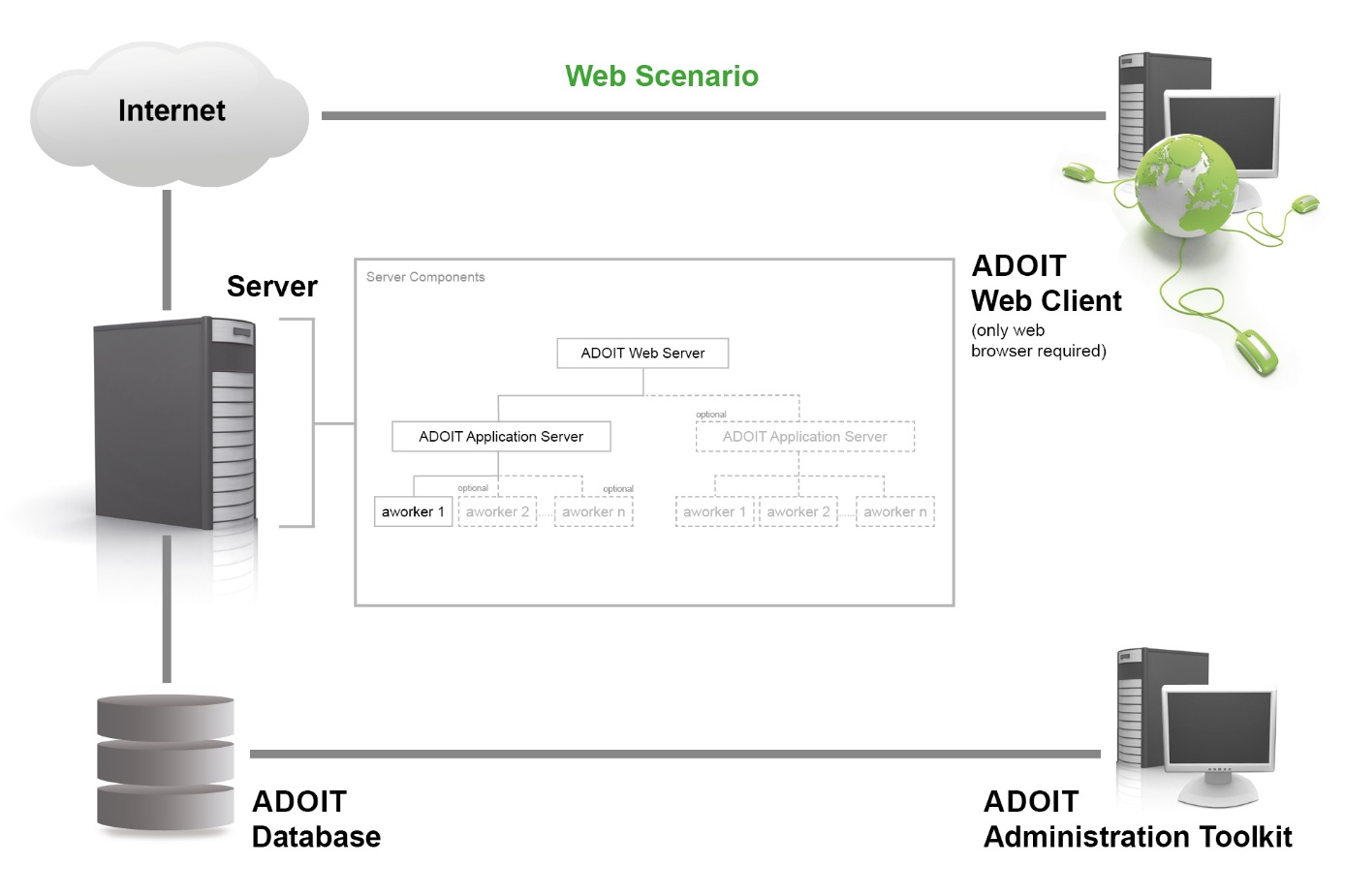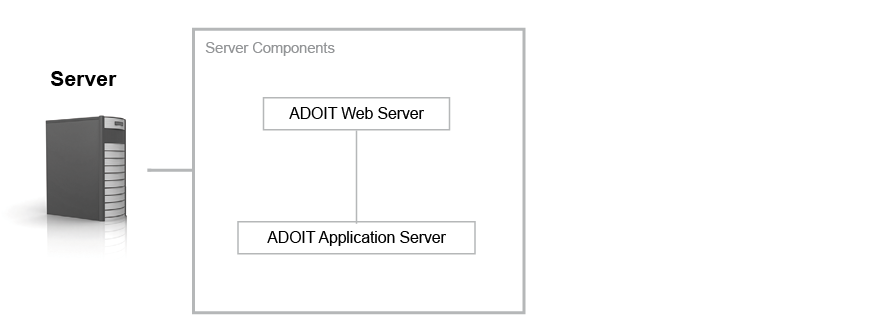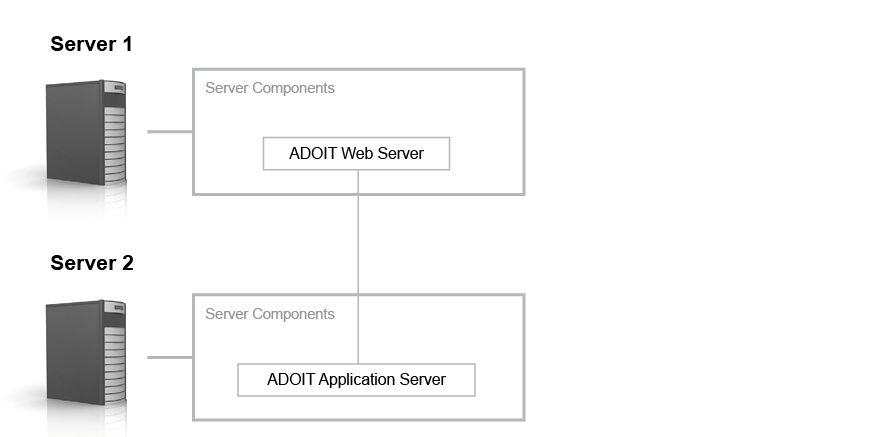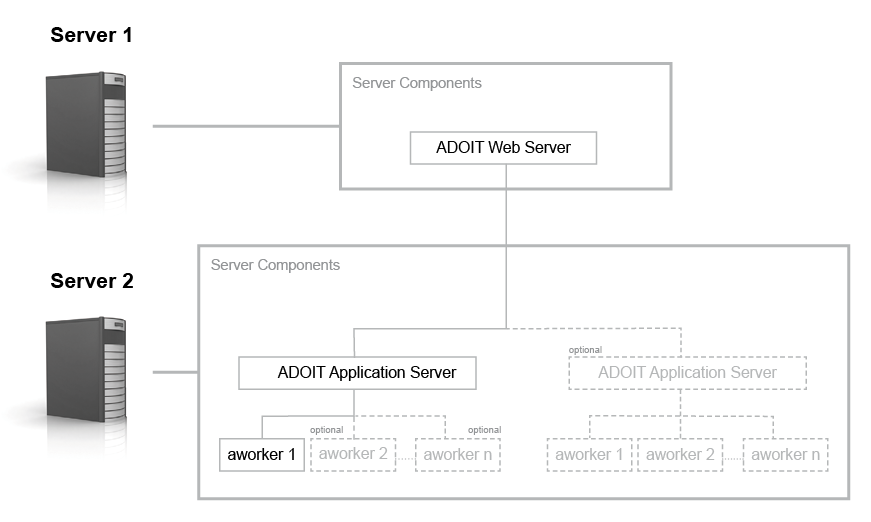ADOIT 16.0 Hardware/Software Requirements

| ADOIT Web Client | Web browser that is used to access the ADOIT web server. ADOIT supports the following desktop browsers: Microsoft Edge, Mozilla Firefox and Google Chrome on Windows and Safari 9 or higher on the Mac. In addition, ADOIT supports Safari on the iPad (iOS 8 or higher). |
| ADOIT Web Server | Web server (platform independent) that is necessary for the communication between ADOIT web client and ADOIT application server. |
| ADOIT Application Server | The ADOIT application server (requires MS Windows) is responsible for the access to the ADOIT database and it contains the functionality of the ADOIT web scenario. Starts one or more aworker processes. |
| ADOIT Database | Database server (platform independent) that manages and stores the ADOIT data. ADOIT supports Microsoft SQL Server, Oracle and PostgreSQL. |
| ADOIT Administration Toolkit | The Administration Toolkit is a desktop application used by ADOIT administrators for administrative tasks such as creating users or assigning rights. |
ADOIT web server and ADOIT application server are running on one server (Standard installation).

ADOIT web server on one server, ADOIT application server is running on another server.

ADOIT web server on one server, ADOIT application server is running on another server. Multiple ADOIT application servers (running on one or more machines) may be used in large scenarios where workload has to be distributed.
Load Balancing is currently only supported at the level of the ADOIT application server. Load Balancing is NOT supported at the level of the ADOIT web server.

| Browser | Desktop Browser: - Microsoft Edge (latest) on Windows
- Mozilla Firefox (latest) on Windows
- Google Chrome (latest) on Windows
- Safari 9 or higher on the Mac (the "Workspaces" scenario is not supported in Safari)
Mobile Browser: - Safari on the iPad (iOS 8 or higher; graphical modelling is not supported on the iPad)
|
| Operating systems | - According to the specifications of Apache Tomcat
|
| Java Version | - Java 8 (8u162 or higher), Java 11 and Java 17. Tested with OpenJDK 8/11/17 from https://adoptopenjdk.net and Oracle JDK 8/11/17.
|
| Web Server | - Apache Tomcat Version 8/9 or comparable Java servlet containers that support the Java Servlet API specification of version 2.5.
- Other server types are not tested. A specific evaluation can be done on request.
|
| Supported protocols | - HTTP, HTTPS, WebSocket for communication between web browser and web server. If a proxy is in use, ensure that the WebSocket protocol is enabled for /websocket.
|
Operating systems
(64-Bit) | - Windows 8.1
- Windows 10
- Windows 11
- Windows Server 2012
- Windows Server 2012 R2
- Windows Server 2016
- Windows Server 2019
- Windows Server 2022
|
| Supported database management systems | - Microsoft SQL Server ODBC driver compatible with the SQL Server version used
- Oracle client compatible with the Oracle server version used
Note: For Oracle at least an Oracle Instant Client 'Basic' is required, the usage of an Oracle Runtime Client is recommended.- PostgreSQL ODBC driver compatible with the PostgreSQL version used
|
| Supported protocols | - Thrift for communication between web server and application server
|
| Operating systems | - All supported operating systems of the chosen database system, if they can be accessed from Windows clients with Call Level Interfaces (ORACLE: OCI) or ODBC (Microsoft SQL Server and PostgreSQL).
|
| Supported database management systems | Microsoft SQL Server: - SQL Server 2012
- SQL Server 2014
- SQL Server 2016
- SQL Server 2017
- SQL Server 2019
- SQL Server 2022
(Enterprise Edition, Standard Edition, Workgroup Edition, Express Edition)
Note: SQL Server Express edition is not recommended for production use.
Oracle Database- Oracle 12c Release 1 or 2
- Oracle 18c
- Oracle 19c
(Standard Edition One, Standard Edition, Enterprise Edition, Express Edition)
Note: Both CDB and non-CDB databases are supported.
Note: When using an Oracle Database Express Edition, functionality and performance restrictions must be considered in regard to the particular operating scenario.
PostgreSQL- PostgreSQL 12.2 or higher
|
| SMTP Server | - The ADOIT web client supports sending of email messages in specified scenarios.
- To use this functionality an SMTP server is required that can be accessed from the ADOIT web server. The address and port are configurable in the Administration Toolkit.
- SMTP Authentication and Transport Layer Security (TLS) are supported.
|
Operating systems
(64-Bit) | - Windows 8.1
- Windows 10
- Windows 11
- Windows Server 2012
- Windows Server 2012 R2
- Windows Server 2016
- Windows Server 2019
- Windows Server 2022
|
| Supported database management systems | - Microsoft SQL Server ODBC driver compatible with the SQL Server version used
- Oracle client compatible with the Oracle server version used
Note: For Oracle at least an Oracle Instant Client 'Basic' is required, the usage of an Oracle Runtime Client is recommended.- PostgreSQL ODBC driver compatible with the PostgreSQL version used
|
For the various third-party software packages mentioned in the sections above the hardware and software requirements of the individual vendors have to be considered!
| RAM | - Minimum: 1 GB
- Recommended: 2 GB or higher
|
| Processor | - Minimum: Intel Pentium D / comparable processor
- Recommended: Intel Core i7 / comparable processor or higher
|
| Clock speed | - Minimum: 1 GHz
- Recommended: 2 GHz or higher
|
| Screen resolution | - Minimum: 1024 x 768
- Recommended: 1366 x 768 or higher
|
| Colour depth | - Minimum: 65.536 colours / 16 Bit
- Recommended: 16M colours / 32 Bit or higher
|
| Hard disk capacity | - According to the requirements of the used Apache Tomcat version (or comparable environment)
- Additionally, 250 MB free hard disk capacity for the installation of the web application
|
| RAM | - A minimum of 2 GB is required by ADOIT in use with an Apache Tomcat web server.
- Recommended: 4 GB or higher
- Additional system resources according to the environment (size of the database, number of users)
|
| Processor/Clock speed | - Minimum: 2.5 GHz
- Recommended: latest generation server processor with 3.5 GHz or higher
|
| Hard disk capacity | - At least 1 GB of disk space for the installation directory
- Write permissions to the installation directory are necessary.
|
| RAM | - Minimum: 2 GB for the ADOIT application server service, with an additional 1 GB allocated for each configured aworker process
- Recommended: 4 GB or higher for the ADOIT application server service, with an additional 2 GB allocated for each configured aworker process
- An additional 6 GB RAM is required if at least 10 GB of external documents have been uploaded into the database
- Additional system resources according to the environment (size of the database, number of users)
|
| Processor/Clock speed | - Minimum: 2.5 GHz
- Recommended: latest generation server processor with 3.5 GHz or higher
|
| Hard disk capacity | - Minimum: According to the specifications of the DBMS manufacturer
- Recommended: 2 GB per ADOIT database instance. This value depends on the size of the stored data and may be higher
|
| RAM | - Minimum: 500 MB are required for the first ADOIT database instance; another 500 MB are required for each additional database instance;
- Recommended: Depending on the amount of stored data it might be necessary to provide more memory for the database instance.
|
| Processor/Clock speed | - Minimum: According to the specifications of the DBMS manufacturer
- Recommended: 2 GHz or higher
|
| Hard disk capacity | - At least 1 GB of disk space for the installation directory
- Write permissions to the installation directory are necessary.
|
| RAM | - Minimum: 1 GB
- Recommended: 2 GB or higher
|
| Processor/Clock speed | - Minimum: 2.5 GHz
- Recommended: 3.5 GHz or higher
|
| Screen resolution | - Minimum: 1024 x 768
- Recommended: 1366 x 768 or higher
|
| Colour depth | - Minimum: 65.536 colours / 16 Bit
- Recommended: 16M colours / 32 Bit or higher
|
The ADOIT web server, the ADOIT application server and the DB server must be located in the same LAN (local area network). The IP address of the ADOIT web server and that of the ADOIT application server must be in the same network segment.
The bandwidth requirements between the individual components are listed below:
| ADOIT Web Client – ADOIT Web Server | - Minimum: 2 Mbit
- Recommended: 10 Mbit
|
| ADOIT Web Server – ADOIT Application Server | - Minimum: 10 Mbit
- Recommended: 100 Mbit
- LAN-like latency
|
| ADOIT Application Server – DB Server | - Minimum: 100 Mbit
- Recommended: 1 Gbit
- LAN-like latency
|
| ADOIT Administration Toolkit – DB Server | - Minimum: 2 Mbit
- Recommended: 10 Mbit
- LAN-like latency
|
This section describes the different authentication mechanisms of the ADOIT web client. The authentication mechanisms can be used separately or in combination. Depending on the used authentication mechanisms, further installation-specific configuration steps may be necessary. Please consult your ADOIT consultant for further information.
| Standard ADOIT users | - ADOIT users are created in the Administration Toolkit.
- Login to the ADOIT web client requires input of username and password. These credentials are used to authenticate the user against the available data in the ADOIT database.
- The assignment of user attributes, rights and system roles is controlled via the User Management component in the Administration Toolkit.
|
| LDAP Authentication | - Users can either be imported from a directory service or mapped to ADOIT users.
- Login to the ADOIT web client requires input of username and password. The provided credentials will be used to authenticate the user against the configured directory service.
- A precondition for this scenario is that the connection of ADOIT to the directory service in use (e.g. Active Directory) is established on the Admin Page.
- The assignment of user attributes, rights and system roles may be controlled via the User Management component in the Administration Toolkit or synchronised with an external directory service.
- Specific configuration steps are necessary when setting up the ADOIT web client for this authentication mechanism. Please consult your ADOIT consultant for further information about this authentication mechanism.
|
| IDM Authentication | - Users can either be imported from an external user management system or mapped to ADOIT users.
- Login to the ADOIT web client via single sign-on is possible using an Identity Management System (IDM)
- A precondition for this scenario is the connection of ADOIT to an authentication server in the target environment which provides means for authentication with an external user management system (e.g. Microsoft Internet Information Services connected to an Active Directory).
- The assignment of user attributes, rights and system roles may be controlled via the User Management component in the Administration Toolkit or synchronised with an external user management system.
- Specific configuration steps are necessary when setting up the ADOIT web client for this authentication mechanism. Please consult your ADOIT consultant for further information about this authentication mechanism.
|
| SAML Authentication | - Users can either be imported from an external user management system or mapped to ADOIT users.
- The external user management system must provide an Identity Provider (IdP) for SAML 2.0 (e.g. Active Directory Federation Services [AD FS] or Shibboleth).
- To log on to the ADOIT web client, the user is redirected to the IdP. Depending on the configuration of the IdP, the authentication is carried out via single sign-on or by entering access data (username and password, certificates, etc.).
- No server-to-server communication is necessary for this authentication mechanism, since all data is transmitted via the browser.
- The assignment of user attributes, rights and system roles may be controlled via the User Management component in the Administration Toolkit or synchronised with an external user management system.
- Specific configuration steps are necessary when setting up the ADOIT web client for this authentication mechanism. Please consult your ADOIT consultant for further information about this authentication mechanism.
|
| OIDC Authentication | - Users can either be imported from an external user management system or mapped to ADOIT users.
- A precondition for using OpenID Connect (OIDC) is the connection of ADOIT to an OpenID Connect provider (OP) that verifies the identity of the user as well as provides basic profile information about the user.
- To log on to the ADOIT web client, the user is redirected to the OP. Login to the ADOIT web client via single sign-on is possible using OIDC authentication.
- The assignment of user attributes, rights and system roles may be controlled via the User Management component in the Administration Toolkit or synchronised with an external user management system.
- Specific configuration steps are necessary when setting up the ADOIT web client for this authentication mechanism. Please consult your ADOIT consultant for further information about this authentication mechanism.
|
- LDAP/LDAPS support for the providers AD (Active Directory) and eDirectory and comparable LDAP providers.
- Other LDAP providers are not tested. A specific evaluation can be done on request.
|
This table contains a summary of the features of the different authentication mechanisms.
| Standard ADOIT Users | LDAP Authentication | IDM Authentication | SAML Authentication | OIDC Authentication |
|---|
| Login with username and password | Yes | Yes | Yes (depending on the IDM solution) | Yes (depending on the SAML IdP) | Yes (depending on the OP) |
| SSO | No | No | Yes (depending on the IDM solution) | Yes (depending on the SAML IdP) | Yes (depending on the OP) |
| On login, synchronize attributes, role and group assignment (with external user management system) | No | Yes | Yes | Yes | Yes |
| Periodically, synchronize attributes, role and group assignment (with external user management system) | No | Yes | Yes (with LDAP coupling) | Yes (with LDAP coupling) | Yes (with LDAP coupling) |
| Create users automatically | No | Yes | Yes | Yes | Yes |
Based on example scenarios, this section describes which hardware requirements the servers in the ADOIT web scenario must meet. If your scenario is different from the presented options, please consult your ADOIT consultant at BOC.
The following requirements are for ADOIT only.
| Description | - This scenario includes a model repository of 1,000 models with a medium average model size (up to 40 objects and relations per model).
- There are a maximum of 5 concurrent ADOIT users.
- Load balancing is not required in a scenario of this size.
|
| Number of CPU cores (virtual) | - ADOIT web server: 2 CPU cores
- ADOIT application server: 3 CPU cores
|
| RAM | - ADOIT web server: 3 GB total
- ADOIT application server: 4 GB total
|
| Hard disk capacity | - ADOIT web server: 1 GB total
- ADOIT application server: 3 GB total
- DB server: 2 GB total
|
| Description | - This scenario includes a model repository of 1,000 models with a medium average model size (up to 40 objects and relations per model).
- There are a maximum of 20 concurrent ADOIT users.
- Load Balancing is currently only supported at the level of the ADOIT application server. Load Balancing is NOT supported at the level of the ADOIT web server.
|
| Number of CPU cores (virtual) | - ADOIT web server: 3 CPU cores
- ADOIT application server: 4 CPU cores
|
| RAM | - ADOIT web server: 4 GB total
- ADOIT application server: 5 GB total
|
| Hard disk capacity | - ADOIT web server: 1 GB total
- ADOIT application server: 4 GB total
- DB server: 2 GB total
|
| Required permissions | The user running the Apache Tomcat web server service needs: - Write permissions to the temporary directory (%TEMP%)
- Write permissions to the ADOIT web application directory within "<Tomcat installation>/webapps" and all its subdirectories
- Write permissions to the directory in which the log files are configured to be written. By default, the logging output is written to the folder "<Tomcat installation>/logs"
- Read permissions to the Apache Tomcat installation directory
|
| Required permissions | The user running the ADOIT application server service needs: - Write permissions to the temporary directory (%TEMP%)
- Write permissions to the directory in which the log files are configured to be written. By default, the logging output is written to the folder "<ADOIT installation>/logs"
- Read and execute permissions to the ADOIT application server installation directory
If the user has no write permissions to the temporary directory, no log files can be created there, and an event will be logged in the Windows Event Log. |
| Required permissions | A user running the ADOIT Administration Toolkit needs: - Write permissions to the temporary directory (%TEMP%)
- Read and execute permissions to the ADOIT installation directory
If the user has no write permissions to the temporary directory, no log files can be created there, and an event will be logged in the Windows Event Log. |
A Windows user requires the access permissions stated below in order to run ADOIT. In a standard Windows environment these permissions are usually given, but in a Citrix environment it may be necessary to explicitly set these permissions.
| Required permissions | - Execution permission in the ADOIT installation directory
- Execution and write permissions to the target directory of each export (AXL, XML, AXS, HTML, PDF, etc.)
- Execution and write permissions to the temporary PDF output directory
- Execution and write permissions to the temporary directory (%TEMP%)
- Execution permissions to the application data directory (%APPDATA%)
- Write permissions to the temporary directory of the user profile from the command line
|



